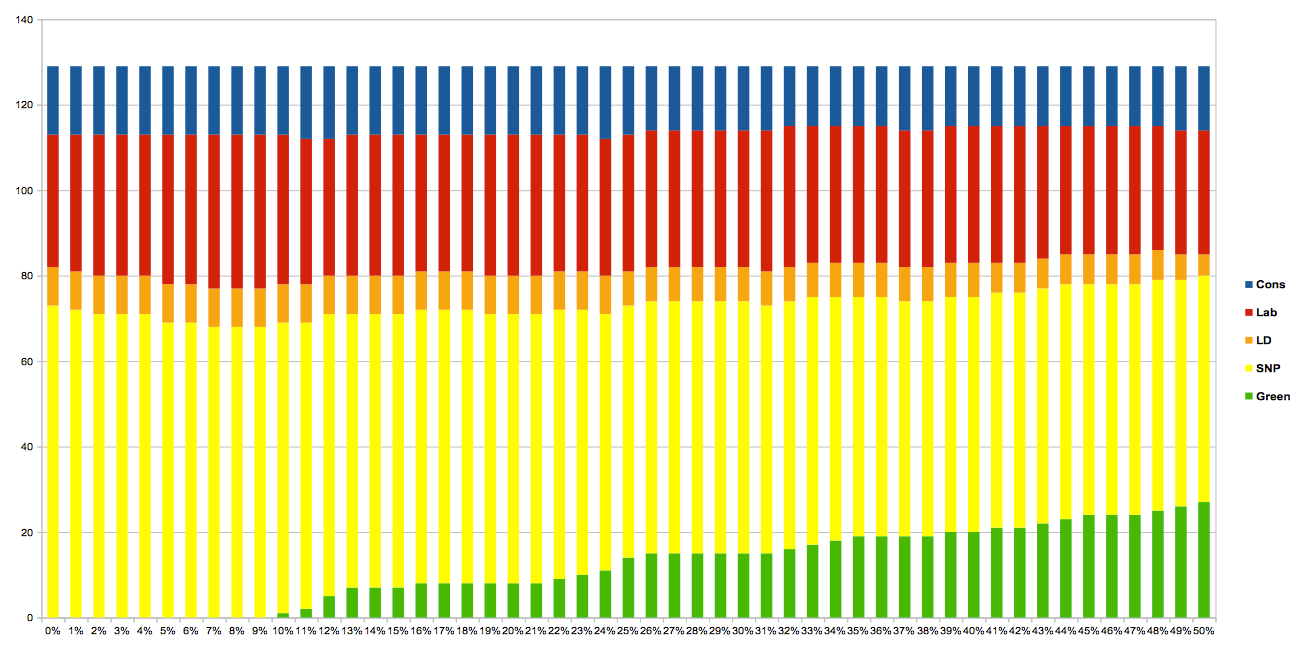Green list voting
People have been busy on social media discussing the pros and cons of splitting the vote next year, i.e., using the constituency vote to support the SNP and voting Green on the list (see for instance this for the positive case, and this for why it might backfire).
I find it interesting that people can disagree so strongly while supporting the same goals, so I decided to have a look at the data myself. I took the 2015 General Election results and fed them into the list vote, and assumed the constituencies would not change hands since the 2011 election (which is not very realistic, but I’ll return to that below). Because hardly anybody voted Green this year, this obviously led to another SNP landslide victory. I then treated the combined SNP and Green vote as one block of Yes votes, and then looked at what happened if a specific percentage of these Yes votes voted Green instead of SNP on the list — on the left-hand side, every Yes voter is voting SNP on the list, and on the right, half of them are voting Green:
The interesting thing here is that the number of Yes MSPs (SNP + Green) at first falls as the percentage of Green voters goes up, but it then starts rising again, and eventually it overtakes the previous maximum.
In other words, the best solution is that nobody votes Green, or that more than 25% of Yes voters do so. The worst possible scenario is that about 8% of Yes voters vote Green on the list.
What if we assume the SNP will win all constituencies apart from three, just like the General Election result? The graph then looks as follows:
The effect is exactly the same (and the minimum is still at 8% of Yes voters), but the SNP loses fewer seats (because they get fewer list seats), and so the positive effects of splitting the vote arises earlier, when 10% of Yes voters vote Green.
All of this taken together makes it really hard to give advice to voters. If the SNP looks like doing phenomenally well in the constituencies and the Green party is expected to get at least 5% of the list votes, then all Yes voters should split their votes; if on the other hand the SNP is doing less well in the constituencies than on the list and the Green party is hovering around 2% in the opinion polls, then nobody should consider splitting their votes. And if the opinion polls are wrong (like they were this year), then any such advice could spectacularly backfire — the best laid schemes o’ mice an’ men gang aft agley. (As an example of this, look no further than the advice I produced before the 2011 election, which was based on Labour doing extremely well in the constituencies, and so my conclusions were all wrong.)
PS: I’ve completely ignored the SSP here for simplicity’s sake. Obviously all the conclusions above would be the same if the vote splitting was benefitting the SSP instead of the Greens; however, if both parties are competing for Yes list votes, it increases the risk of wasted votes.


analysis of how the seats may fall in 2016 depending on the % of votes given on the List vote to the Indy parties. http://t.co/QE7AuxAxV6
I’ll be voting straight SNP until Scotland is Independent.
The only place I would consider voting differently is in Local Authority elections. I used to think Independents on a Council were a good thing but having seen how they act and what they do in my area, I have changed my mind.
Definitely. We should not get carried away with assumptions we are going to sweep the board. the Holyrood electoral system was designed to stop any one party from gaining a majority and it would be very easy to lose that if we start being too clever and voting tactically. If we lose the majority in Holyrood we lose leverage in Westminster as we no longer have the ability to call a referendum if the UK government don’t come up with the goods.
Additionally every single vote for the SNP counts to give us a mandate to continue to press for Independence. There are already enough opponents trying to play fantasy voting and claim we only got 37.5% of the vote or whatever figure some other convoluted arithmetic can arrive at. Imagine if we lose votes at the 2016 election, they and the media will have a field day and we will be portrayed as losing support whatever the reason behind it.
We need every vote for the SNP we can get on both papers. Once when we have achieved Independence is the time to start thinking how we want the government to look
RT @MairiMorrison1: Interesting article on whether to vote SNP first and then Green or socialist on the list vote. http://t.co/9pivg3qs0W
@DrMoragKerr @PaulaHoneyRose just fyi on what we were discussing last night. worth a look
http://t.co/BGAqvYcPPV
The slight difficulty I have with this, is the suggestion that a Green vote is a pro-indy vote. Given that some of the selected Green candidates are known unionists, this seems a trifle optimistic.
I appreciate that. However, it’s completely clear that any additional support they’ll get next May will come from pro-independence voters as an appreciation of the wonderful way Patrick Harvie and other people from the Green party articulated Yes arguments during the indyref.